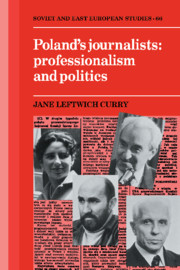Book contents
- Frontmatter
- Contents
- Acknowledgments
- 1 Journalists as professionals in theory and reality
- 2 The postwar roots of the profession
- 3 Living and learning journalism
- 4 Professional associations and professional politics
- 5 Journalists as political actors
- 6 Solidarity and beyond: the critical test of professionals and professionality
- Appendix: Research methodology: unwritten answers
- Notes
- Select bibliography
- Index
- Soviet and East European Studies
6 - Solidarity and beyond: the critical test of professionals and professionality
Published online by Cambridge University Press: 30 September 2009
- Frontmatter
- Contents
- Acknowledgments
- 1 Journalists as professionals in theory and reality
- 2 The postwar roots of the profession
- 3 Living and learning journalism
- 4 Professional associations and professional politics
- 5 Journalists as political actors
- 6 Solidarity and beyond: the critical test of professionals and professionality
- Appendix: Research methodology: unwritten answers
- Notes
- Select bibliography
- Index
- Soviet and East European Studies
Summary
In August, 1980, strikes in the shipyards and later in the coal mines of Poland marked the beginning of what, for many journalists, was both their moment of glory and their Waterloo. As they were drawn in and swept along by the tides of political reform and demands for more and more change, the professionalism of Polish journalists was tested at all levels. Political restraints were lifted so that the professional powers journalists had long sought suddenly became a reality. New papers were formed and editors brought in who were committed to supporting the profession and its rights. At the same time, journalists were challenged by “grassroots writers” who sought, sometimes successfully, to displace them and the media they produced. Journalists' reactions, as individuals and as a group, were a test, then, of their professionalism as well as their powers.
With the imposition of martial law, journalists initially had to face more political intervention than at any time since the Stalinism of the fifties. This intervention, in turn, forced them to reconsider the level of their professional commitment, and their willingness to tolerate public political intervention in their work. For some, the promise of upward mobility within their profession was an important consideration. For others, the primary issue was their self-definition as professionals. With this, they could no longer tolerate working under visible political controls and being seen as political henchmen for the regime.
- Type
- Chapter
- Information
- Poland's JournalistsProfessionalism and Politics, pp. 205 - 242Publisher: Cambridge University PressPrint publication year: 1990

